Does the place of residence affect land use preferences? Evidence from a choice experiment in Germany
Published 2020-12-14
Keywords
- Landscape preferences,
- latent class model,
- spatial heterogeneity,
- willingness to pay
How to Cite
Funding data
-
Bundesministerium für Bildung und Forschung
Grant numbers 01LL0909C
Abstract
Discrete choice experiments can be used to inform policy makers on people’s preferences for landscapes and cultural ecosystem services. Recent studies have shown that the spatial context influences preferences and related willingness to pay values. In this paper we investigate the effect of the landscape surrounding people’s places of residence on their willingness to pay using data from a discrete choice experiment on local land-use changes and cultural ecosystem services throughout Germany. For analysis, we apply a latent class logit model and include landscape categories as explanatory variables for class membership. We find that the different landscapes people live in are correlated with preferences. Especially people from urban areas and farm- and grassland landscapes have larger willingness to pay values for improvements in cultural ecosystem services than people from forest landscapes and cultural landscapes. The results are important for policy makers as different willingness to pay values in different landscapes imply different welfare effects for land use changes. Taking this information into account can help in reaching more efficient resource allocations.






